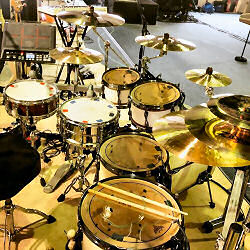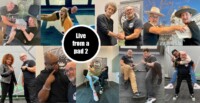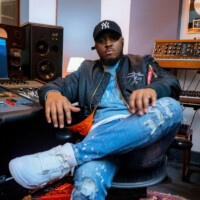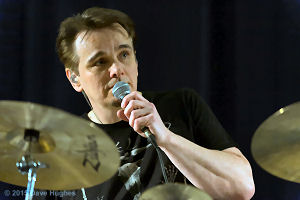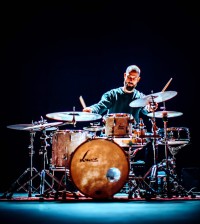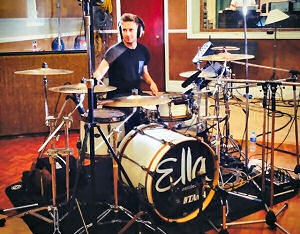 On his way to joining the list of the UK’s most in demand session drummers, Ross Harris already played for top artists from all kinds of genres. With names like James Arthur, Tricky, Duke Dumont, Laura Welsh, Union J, Maverick Sabre, and Josh Osho on his CV (to name a few), he is currently in the chair for chart-topper Ella Henderson – and all of this before his 24th birthday.
On his way to joining the list of the UK’s most in demand session drummers, Ross Harris already played for top artists from all kinds of genres. With names like James Arthur, Tricky, Duke Dumont, Laura Welsh, Union J, Maverick Sabre, and Josh Osho on his CV (to name a few), he is currently in the chair for chart-topper Ella Henderson – and all of this before his 24th birthday.
I met up with Ross at his studio in West London to chat about his journey from a young drummer inspired by his big brother, to traveling the world setting the groove behind one of UK’s biggest pop artists of 2014/2015.
How did it all start? Why drums?
Hmm, good question. Probably my brother I’ll have to say, although no one likes to admit that they copied their older brother. [laughs]
He started playing when he was young and I just picked up the sticks as well. It happened to work out quite well for both of us – which is weird because nobody else in the family plays an instrument (except my sister who plays the flute!). I started properly in primary school and then played more throughout high school. It wasn’t until I had lessons that I started to realise I had to use my feet – all I could do was hands for a while! [laughs]
Who were your influences over the years?
I’d have to say my brother again, he introduced me to one of my biggest musical influences – Toto, by showing me the 2003 live album. We went mental listening to that.
My drummer influences, apart from Simon Phillips, would have to be Aaron Spears. As soon as I saw that ‘Caught Up’ video, that’s when I went through my little gospel phase learning all the licks. I think every drummer has one of those. These are the main two, but I also played a lot of jazz when I was young so Buddy Rich and all the other greats were big influences too.
I was also pretty heavily influenced by my teachers back home: Lee Hopson and Rob Hayward, and when I first moved to London Pete Ray Biggin was, and still is, a great influence. He helped me out loads!
What do you think are the most valuable aspects of music you learned over the years?
Me and my brother actually started in orchestras, which was where I learnt to read music.
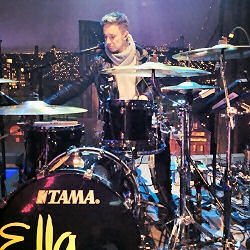 I’d say the time spent with Sandwell Youth Music was another of our big influences (next to other drummers). We played three times a week for about eight years: brass band, orchestra and jazz band.
I’d say the time spent with Sandwell Youth Music was another of our big influences (next to other drummers). We played three times a week for about eight years: brass band, orchestra and jazz band.
Reading became very valuable later on. I don’t agree with anyone who says you don’t need to read. You might not need to, but it can’t hurt, it’s not gonna hinder your playing.
Also, I’d say it’s important to learn harmony and theory. For me, learning to play keyboard was very helpful. It simply gave me a greater understanding of the rest of the music. You can hear when things change and know what to do as a drummer.
You initially came to London to do a degree in music. Was that the time you decided you want to play drums for a living?
No, I pretty much decided that in high school already, when I was about 13/14 – or definitely some sort of career in music. My parents always stressed how important it is to go to university and get a degree. My brother went to London two years before me to study drums and I just always knew London was the place to be, nothing really happened in Birmingham!
Do you think a degree in music is helpful for a career nowadays?
Uh, I don’t know man. I think 50/50. I don’t think it contributes to a career but it contributes to your growth as a drummer, which then helps your career. I mean, you can’t get gigs from having a degree. It seems that everyone thinks that when they finish uni Beyoncé will call them and say: ‘Ah you finished your degree now, you can come and play for me’. [laughs]
I think it depends on the curriculum, the teachers… so many factors. My brother always said: ‘Know when to listen and know when not to listen’. Because there are teachers who talk rubbish, as we both know. But then you get teachers like Erik Stams, Iain Goodall, Simon Carter and Oz (James Oscroft) who are just really good and very helpful.
I think generally these places are good to go to because you get to meet people, especially for people from outside of London like me and you. A lot of people who have lived and grown up in London maybe don’t see the struggle of trying to infiltrate from the outside! Oh, and student loan… [laughs]
I do think these schools are leaving out one very important part of the business though:
they don’t teach you how to do an invoice, how to do a tax return, how to deal with tour life, jet lag, staying healthy and so on. These things can be really difficult and sometimes they are more important than your playing. I’d actually love to do a group masterclass about that with a bunch of people who have done certain bits in the industry.
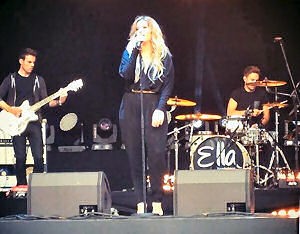 When and how did your first pro gig come about then?
When and how did your first pro gig come about then?
That was during my second year at uni, an artist called Josh Osho. I got that through a bassist friend of mine who I did a jam night at Troy bar with. It’s a real funny cycle looking back; there are so many links on that path to how I got it. But yeah I think someone else was busy, so he called me. [laughs]
First thing we did was the Radio 1 Live Lounge, I was sh***ing my pants! Unfortunately the gig didn’t last long. He was a really great artist but it just didn’t work out for him. He’s still one of the best artists I’ve ever played for though!
After that I did a few little bits here and there but then Tricky was the proper big one I suppose.
Within two years you went from finishing uni to playing ten nights at the O2 Arena. That’s quite a leap!
Yeah, I mean we were supporting at those shows at the O2 but I’ve been quite lucky I think. I had quite a steady flow of work since uni. The Tricky gig came at a really awkward time right when I was trying to do my final performance projects and essays at uni. so at lot of my final essays were written at 30,000 feet. That caused lots of sleepless nights. [laughs]
I know its pretty tough for a lot of people but fortunately it’s been quite smooth for me. I got a lucky gig and then met the right people, which was invaluable.
I remember that time when you had about five pop gigs at the same time. How did you juggle all that?
[laughs] Yes, the first year out of uni was very busy, almost too busy. It was pretty stressful to try and juggle everything without pissing off managers, labels and artists. Although it may have looked like I was being greedy, I just couldn’t dep them out. A lot of them were smaller artists with no budget, so they didn’t wanna pay for extra rehearsals. It was very stressful but still really fun. It’s nice to kind of have only one main gig with Ella now though.
What did you find the most important skill to have a session musician nowadays?
Being a nice guy is the first one, even before your playing. If you’re an idiot, nobody is gonna wanna hire you. [laughs] If you’re not ok to tour with you won’t get hired, no matter how good you are. Of course also the standards like being punctual and all that.
Also, try to make yourself indispensable. That’s quite important for your own safety. I managed to do that during the time I was juggling gigs. There were moments when they may have liked to sack me because I tried to dep it out, but they knew that they would need lots of rehearsals because the parts were so complicated and personalised.
Nowadays everyone thinks musicians are just hired guns that can do anything. For example we got asked to do the James Arthur gig: 90 minute set, the whole band were deps, no rehearsals – and the label just assumed: “yeah, you’ll be fine”.
Hmm, I think playing-wise it’s pretty simple. It depends on what you do but if you do pop stuff you can’t really do it wrong unless you got no groove at all.
Tricky was quite difficult due to the craziness of the gig – there’s no set list, no structures and he conducts pretty casually but wants you to follow him. I had to watch like a hawk for two hour shows and really think on my feet to see what was coming next. Also dealing with artists like Tricky can be difficult if you’re not thick skinned. He will just shout at you, might sack you on the spot and then hire you again five minutes later. Just know your battles with artists and labels.
Your main gig is Ella Henderson at the moment. How did that come about?
I knew her MD through a few other projects I worked with him on and he invited me in for an audition. I had actually gigged with Ella before the audition, so I was kind of had my foot in the door which helped.
You’ve done some really high profile gigs with her. Were there any ‘pinch me’ moments?
I think Letterman was probably the best, definitely one of my bucket list things to do. It was really nice to do it before he finished actually doing his show. That was probably the best moment. Also the BBC awards were pretty cool. We played with Ella and Labrinth at Earls Court. Again, great to play that venue before it closed down.
Generally I just got to go to some really cool places. Going to New York and L.A for the first time ever for work was pretty amazing. A few weeks later Sydney and New Zealand too. It was really nice to see all these places I had never seen. Going there for work was a bonus.
That gig has quite an electronic side to it. Does your job as a drummer change therefore?
Yes, there’s quite a lot of samples to hit. On this new drum’n’bass track I’m basically more a DJ than a drummer. I’m triggering a break consisting of three rhythmical sample –triggering them perfectly in time with the track was quite tough. I guess knowing how to program stuff like that is pretty important or else we wouldn’t be able to do these tracks live. So yeah, it does change a little bit, you kind of have to adapt to survive and make yourself more than just a drummer/percussionist/DJ/sampler. But I think that’s just part of it nowadays.
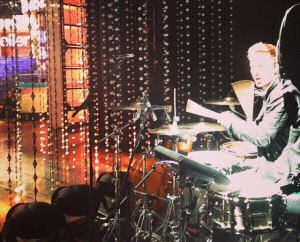 Did you set up change for that gig or is it similar to your other pop rigs?
Did you set up change for that gig or is it similar to your other pop rigs?
With Ella it’s usually just a pretty standard kit with an SPDSX and triggers. The most unorthodox set up I’ve used was on the Laura Welsh gig. For those gigs I had lots of additional pads and was standing up, which was actually really fun. The music was much more electronic though so I felt more like a DJ than a drummer. I wasn’t playing traditional drum beats but instead was hitting a lot of sounds and samples, so it just felt right to stand up like the rest of the band. Sitting down and hitting very lightly just felt weird. [laughs]
We’ve mentioned your brother Luke earlier, he’s a very successful session drummer too. Were there ever any clashes because of that or is it maybe more of an advantage?
No, there were never any clashes, we were always very supportive of each other, which is the best way to be I think. It’s a shame that we’re both drummers though. If I was a bass player we’d probably be on the same gigs.
If we’re honest, he put in most of the ground work for both of us. Luke was the one who came down to London without knowing anybody and managed to meet the right people who gave him work. He definitely helped me getting my first gigs, so I’m very grateful.
We actually did a few auditions together and both got the call back – just us two – which is awkward but also really funny. We’d always both wanted each other to get it, which is kind of the way we look at it.
I know you sing backing vocals for most of the artists you’re playing for too. Was that always a passion or did you ‘have to’ pick it up?
I sang a bit in school. It was never the cool thing to do though so I didn’t do it much. I think it was in a rehearsal with Josh Osho when I just started to sing along. He heard me singing and went: “get a mic, that sounded good”. That then became one of the most important things for me getting hired, I think. Having a drummer who uses electronics and does BV’s is pretty much what everyone wants because it saves money for two other people. You basically save them hiring a percussionist who plays pads and a backing singer if you can do all three (sorry singers!).
Talking about singing: You were a contestant on ‘The Voice’ 2014?
Yes. That was thanks to a friend of mine who talked me into it.
I had thought about it over the years – just as a laugh I always thought about what song I would actually do if I was to do it. But I never really wanted to do it for many reasons, just because I really don’t agree with any of those shows.
I was on a gig with a friend of mine who works as a scout for the show and she asked me to do it because they needed young lads. I thought I’m not gonna loose anything by just doing the first audition. That went well, they called me back for another one, that went well too, and then I was already on the show. They really wanted me on there because they liked the story of me being a ‘drummer trying to break out to the front’ and all that sh*t. [laughs]
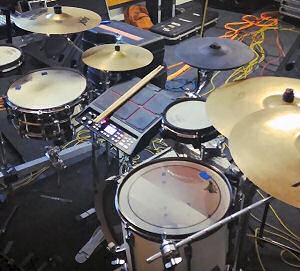 I kind of went along with it because I just thought it would be interesting to see how it all goes down backstage, see all the mind games, and there are a lot of mind games. Luckily already knowing how the industry worked helped, and being used to performing, they didn’t really know what to make of me.
I kind of went along with it because I just thought it would be interesting to see how it all goes down backstage, see all the mind games, and there are a lot of mind games. Luckily already knowing how the industry worked helped, and being used to performing, they didn’t really know what to make of me.
So yeah, the singing thing just always was an idea I had and I thought it would be a good experience to see how it would go – didn’t go too well… [laughs]. I’m actually really glad I didn’t go through because if I had, I would have missed the Letterman gig with Ella.
You’re currently working on some original material too, what’s the plan with that?
Yes, I’ve always been into writing music, ever since I learnt to play piano and strum a few chords on the guitar. I like songs with vocals, but also worked on some ‘muso’ stuff whilst I was at Uni, which I really enjoyed, kinda Jazz fusion sort of stuff, I’d love to get into it again.
Would becoming an artist be the next step for you as a natural progression?
I don’t know. The next year will be quite interesting. I do love drums more than anything but I also get certain enjoyment from creating music and love playing piano and singing. I think there’s a gap for something a bit different, a bit more real. Music made by real musicians rather than people who don’t know what they’re doing but they look interesting, which is sometimes the people we have to work for. [laughs]
And finally, what’s next in the diary?
Mainly stuff with Ella Henderson at the moment. We have some festivals coming up with her over the summer, some here in the UK, some abroad, and then her UK tour in October. Hopefully there’ll be a second album and a second campaign soon too. Maybe some more gigs with James Arthur, just done a few with him recently, and some other gigs I sit in on, and who knows, whatever’s next I suppose!
Thanks a lot for your time Ross. All the best for the rest of the summer.
Interview by Tobias Miorin
September 2015

